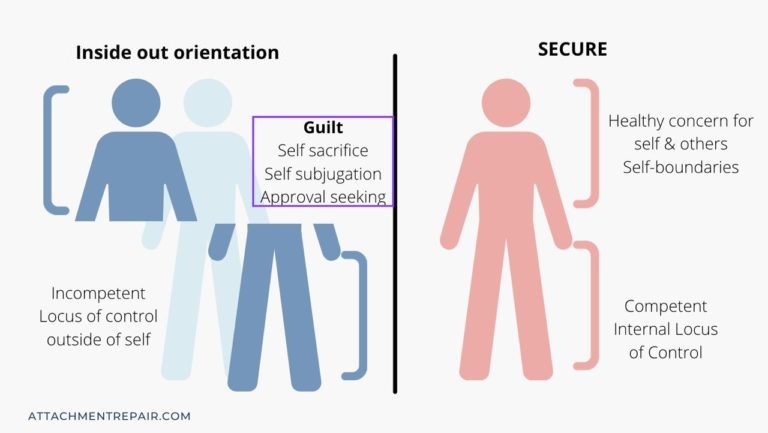
Codependency and Other-Directedness
Self-Paced Course
This is a digital Self-Paced Course
- Simply purchase and download the zip
- Lifetime access to course material
Download contains:
- 5 video lectures, 4 hours total
- 13 guided meditations, 3 hours total
Overview
This self-paced course is an opportunity for people with codependent tendencies to gain freedom from limiting beliefs. We will bring awareness and understanding to the beliefs that inform compulsive caretaking and disconfirm them with targeted meditation. This course will focus on working through negative early attachment conditioning especially as it relates to codependency and other-directedness. We will approach this from attachment theory and attachment repair perspectives.
Those schemas are:
This course will focus on working through negative early attachment conditioning especially as it relates to codependency and other-directedness. We will approach this from attachment theory and attachment repair perspectives.
Those schemas are:
- Approval Seeking/Attention Seeking
- Self-Sacrifice
- Self-Subjugation
 Schema Therapy
According to Jeffery Young “An early maladaptive schema is a pervasive self-defeating or dysfunctional theme or pattern of memories, emotions, and physical sensations, developed during childhood or adolescence and elaborated throughout one’s lifetime, that often has the form of a belief about the self or the world.” Jeffrey Young also calls the schemas “life traps”.
Chairwork
Additionally we'll do "chairwork" on our self-sacrificying parts to understand them better. We will see how based on our deeply held "emotional knowings" that there is a part of us that believes that "compulsive care taking is necessary. Then we'll have an emotionally corrective experience so that we no longer experience the self sacrifice as necessary.
This program is for you if you want to work on your:
Schema Therapy
According to Jeffery Young “An early maladaptive schema is a pervasive self-defeating or dysfunctional theme or pattern of memories, emotions, and physical sensations, developed during childhood or adolescence and elaborated throughout one’s lifetime, that often has the form of a belief about the self or the world.” Jeffrey Young also calls the schemas “life traps”.
Chairwork
Additionally we'll do "chairwork" on our self-sacrificying parts to understand them better. We will see how based on our deeply held "emotional knowings" that there is a part of us that believes that "compulsive care taking is necessary. Then we'll have an emotionally corrective experience so that we no longer experience the self sacrifice as necessary.
This program is for you if you want to work on your:
- Tendencies to place others first, even when it harms you
- Traits of insecure attachment
- Exploration and self development, relationships, and emotional regulation
- Understanding of the early foundations of your psychological development

Who is this For
This program is for those of us who...
- Want to work through codependency and excessive self-sacrifice
- Want to work through self-subjugation
- Want to work through approval seeking
- Are looking to improve our psychological health, especially those who have tried other healing modalities with disappointing results.
- Have problems with exploration and self development, relationships and emotional regulation
- Want to understand the early foundations of our psychological development
Benefits & Outcomes
These are some of the benefits you will have by the end of the program
Theoretical Understanding
- Better understanding of schemas and how they affect you.
- Seeing that what you want matters.
- Overview of attachment and how it relates to codependency.
- Seeing how codependent behaviors are ’emotionally necessary’ which helps lessen the shame of the behaviors.
Psychological
- Understanding how compulsive care-taking was adaptive in your childhood, helping you survive
- Lived, emotionally corrective experience that helps us feel that compulsive caregiving is not necessary.
- Less identification with your psychological maladies and quirks.
- A better ability to observe your mind with metacognitive awareness as a result of the mentalization exercises peppered through the guided meditations.
- Better able to do emotional regulation on the spot in your daily life with ‘micro-hits’ of meditation.
- Less blame of self or others.
For your relationships
- Permission to take care of yourself.
- Better appreciation for the importance and value of interpersonal collaboration.
- Stronger ability to connect from a place of security instead of anxiety.
Included Files:
Introduction to Codependency and Attachment Repair |
|
|---|---|
Introduction to Codependency and Attachment RepairVideo
|
40 mins |
Safety, Attunement, and SoothingMeditation
|
9 mins |
Safety, Attunement, and SoothingMeditation
|
15 mins |
Memory Reconsoidation |
|
Memory ReconsoidationVideo
|
29 mins |
Self Sacrifice |
|
Self SacrificeVideo
|
55 mins |
Chairwork on Self SacrificeMeditation
|
11 mins |
Chairwork on Self SacrificeMeditation
|
9 mins |
Schema Repatterning Meditation on Self SacrificeMeditation
|
34 mins |
Schema Repatterning Meditation on Self SacrificeMeditation
|
23 mins |
Self Subjugation |
|
Self SubjugationVideo
|
62 mins |
Chairwork on Self SubjugationMeditation
|
15 mins |
Chairwork on Self SubjugationMeditation
|
10 mins |
Schema Repatterning Meditation on Self SubjugationMeditation
|
28 mins |
Schema Repatterning Meditation on Self SubjugationMeditation
|
25 mins |
Approval Seeking |
|
Approval SeekingVideo
|
63 mins |
Chairwork on Approval SeekingMeditation
|
17 mins |
Schema Repatterning Meditation on Approval SeekingMeditation
|
27 mins |
Chairwork on Approval SeekingMeditation
|
12 mins |
|
|
Frequently Asked Questions
Self-Paced Courses
Payment Questions
Technical Questions
$79
Where did you hear about this Program?
Description
This self-paced course is an opportunity for people with codependent tendencies to gain freedom from limiting beliefs. We will bring awareness and understanding to the beliefs that inform compulsive caretaking and disconfirm them with targeted meditation.

This course will focus on working through negative early attachment conditioning especially as it relates to codependency and other-directedness. We will approach this from attachment theory and attachment repair perspectives.
Those schemas are:
- Approval Seeking/Attention Seeking
- Self-Sacrifice
- Self-Subjugation
Attachment Theory
Attachment Theory describes one of the earliest phases of our psychological development. It describes the behaviours of the infant from ages 6 months to three years of age when it ventures away from the caregiver to explore and then goes back to seek safety, affection, and care from the ‘secure base’. These early experiences imprint on us forming emotional memories (schemas) that go on to condition many aspects of life thereafter.

Schema Therapy
According to Jeffery Young “An early maladaptive schema is a pervasive self-defeating or dysfunctional theme or pattern of memories, emotions, and physical sensations, developed during childhood or adolescence and elaborated throughout one’s lifetime, that often has the form of a belief about the self or the world.” Jeffrey Young also calls the schemas “life traps”.
Chairwork
Additionally we’ll do “chairwork” on our self-sacrificying parts to understand them better. We will see how based on our deeply held “emotional knowings” that there is a part of us that believes that “compulsive care taking is necessary. Then we’ll have an emotionally corrective experience so that we no longer experience the self sacrifice as necessary.
This program is for you if you want to work on your:
- Tendencies to place others first, even when it harms you
- Traits of insecure attachment
- Exploration and self development, relationships, and emotional regulation
- Understanding of the early foundations of your psychological development
